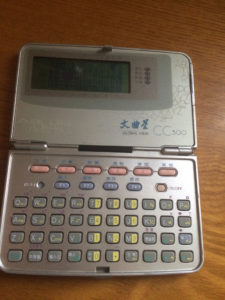
The one thing that all Chinese students studying abroad had was an electronic English-Chinese dictionary. It was a phone sized device with a full keyboard that allowed one to search for both English or Chinese words quickly by typing into its mini keyboard. It would then display the meaning in both languages and be able to pronounce the words as well.
The device drew envies from students from all other countries. While the dictionary functionality was handy, they were especially impressed with the many games that were available on these tiny devices. Standard models came with popular titles such as Tetris, Sokoban, Klotski and Reversi. Some advanced models would even have a quite sophiscated role-playing game (RPG) and the functionality to program one’s own games. In that pre-smartphone age and in a school that was in a small town, these were by far the best entertainment. The fact that you could pretend to be studying during the prep time was also a plus.
You wouldn’t think one will be able to sell an English-Chinese dictionary to a Russian classmate, would you? Otherwise, I would have come with a spared device so that I didn’t have to use a paper dictionary till the replacement arrived by post. But the offer was simply too good to be turned down and there was also a tremendous amount of pleasure to watch the classmate repeatedly failed to break the record I set in the games. I was good at something after all.
Score: Me: 2, English: 2,314 (To keep the game from getting too one sided, I will be extraordinarily generous to myself and give myself one point for being able to sell the electronic dictionary.)